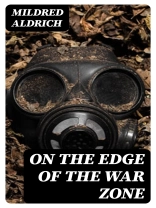In ‘On the Edge of the War Zone, ‘ Mildred Aldrich offers a poignant and vivid account of life during World War I in France. With a captivating narrative style that blends personal reflection with sharp observation, Aldrich immerses readers in the atmospheric tensions of a country on the brink of devastation. Employing rich, descriptive prose, she chronicles both the horrors and the resilience encountered in the war-affected regions, reflecting the broader sociopolitical landscape of early 20th-century Europe. The work stands as a critical historical document, revealing the intimate experiences of those who lived through the turmoil, and advocating for a greater understanding of the human costs of war. Mildred Aldrich, an American expatriate and journalist, found herself deeply affected by the Great War as she resided in France during its unfolding. Her firsthand insights were propelled by her unique position as an observer and participant in the French community. Aldrich’s previous works often touched upon themes of conflict and social change, providing her a rich foundation for the evocative tales and compelling truths captured in this book. For readers interested in historical narratives that combine personal experience with broader commentary, ‘On the Edge of the War Zone’ is an essential addition. Aldrich’s empathetic voice and keen observations create a profound connection to the era, making it a must-read for those seeking to understand the human dimension of war.
عن المؤلف
Mildred Aldrich (1853–1928) was an American journalist, writer, and foreign correspondent who made a significant impact with her work during the early 20th century. Born in Providence, Rhode Island, Aldrich began her career as a schoolteacher. She later ventured into journalism, writing for various newspapers before focusing full-time on her literary pursuits (Zimmerman, 2014). Her extensive travels and experiences in Europe, particularly in France, informed her writings and style.
Aldrich’s most notable work is ‘On the Edge of the War Zone’ (1917), a collection of letters that vividly portrays the grim realities of World War I’s frontline from her unique vantage point at her home in Huiry, a small village near the Marne River. Her writing, laced with poignant observations and personal reflections, brought the harrowing experiences of war directly to her readers, distinguishing her work from other wartime narratives (Aldrich, 1917).
Her literary style is characterized by an introspective and descriptive approach, which is deeply humane yet unsentimental, capturing the rawness of the war’s impact on both soldiers and civilians. Aldrich’s contributions to the understanding of World War I through her letters and other writings have been largely acknowledged by scholars of wartime literature and journalists alike (Smith, 2019). Her works not only provide historical insights but also serve as a testament to the resilience and fortitude of individuals amidst the chaos of war.












